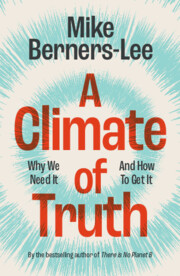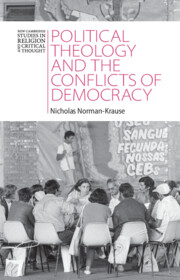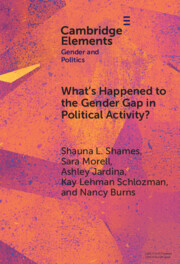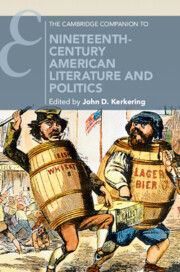1134 results

A Climate of Truth
- Why We Need It and How To Get It
-
- Published online:
- 27 March 2025
- Print publication:
- 27 March 2025
4 - The Middle Layer of the Polycrisis
-
- Book:
- A Climate of Truth
- Published online:
- 27 March 2025
- Print publication:
- 27 March 2025, pp 91-124
-
- Chapter
- Export citation
7 - Getting Truth into Politics
-
- Book:
- A Climate of Truth
- Published online:
- 27 March 2025
- Print publication:
- 27 March 2025, pp 151-173
-
- Chapter
- Export citation

Political Theology and the Conflicts of Democracy
-
- Published online:
- 21 March 2025
- Print publication:
- 03 April 2025
Introduction
-
- Book:
- Political Responsibility and Tech Governance
- Published online:
- 21 February 2025
- Print publication:
- 20 March 2025, pp 1-11
-
- Chapter
- Export citation
Introduction
-
- Book:
- Athens, 403 BC
- Published online:
- 28 February 2025
- Print publication:
- 20 March 2025, pp 1-30
-
- Chapter
- Export citation
7 - The College of Cardinals
- from Part II - The Roman Curia
-
-
- Book:
- The Cambridge History of the Papacy
- Published online:
- 28 February 2025
- Print publication:
- 20 March 2025, pp 182-204
-
- Chapter
- Export citation
Conclusion
-
- Book:
- Athens, 403 BC
- Published online:
- 28 February 2025
- Print publication:
- 20 March 2025, pp 297-328
-
- Chapter
- Export citation
The Melancholy of Japan's Liberal Opposition: Politician-penned Books and Their Narratives of Redemption
-
- Journal:
- Asia-Pacific Journal / Volume 22 / Issue 1 / January 2024
- Published online by Cambridge University Press:
- 14 March 2025, e2
-
- Article
-
- You have access
- Export citation
The Abe Assassination, the Unification Church, and Local Media: A Case Study of Journalism in Toyama Prefecture
-
- Journal:
- Asia-Pacific Journal / Volume 22 / Issue 10 / October 2024
- Published online by Cambridge University Press:
- 14 March 2025, e4
-
- Article
-
- You have access
- Export citation
Against the Storm: How Japanese printworkers resisted the military regime, 1935-1945
-
- Journal:
- Asia-Pacific Journal / Volume 18 / Issue 12 / June 2020
- Published online by Cambridge University Press:
- 14 March 2025, e4
-
- Article
- Export citation
Forging Autocratic Legitimation: Charisma and Mythmaking in Hun Sen's Cambodia
-
- Journal:
- Asia-Pacific Journal / Volume 21 / Issue 2 / February 2023
- Published online by Cambridge University Press:
- 14 March 2025, e2
-
- Article
- Export citation
Komeito's Soka Gakkai Protesters and Supporters: Religious Motivations for Political Activism in Contemporary Japan
-
- Journal:
- Asia-Pacific Journal / Volume 13 / Issue 41 / October 2015
- Published online by Cambridge University Press:
- 14 March 2025, e1
-
- Article
- Export citation
The Threat to Indonesian Democracy in the New Gilded Age of Trump
-
- Journal:
- Asia-Pacific Journal / Volume 15 / Issue 12 / June 2017
- Published online by Cambridge University Press:
- 14 March 2025, e2
-
- Article
- Export citation
If You Liberated Us, Why Are You Still Here? Dilemmas of Global U.S. Military Basing
-
- Journal:
- Asia-Pacific Journal / Volume 22 / Issue 5 / May 2024
- Published online by Cambridge University Press:
- 14 March 2025, e1
-
- Article
-
- You have access
- Export citation
Introduction: Behind the Scenes of Media and Legal Responses to the Abe Assassination
-
- Journal:
- Asia-Pacific Journal / Volume 22 / Issue 10 / October 2024
- Published online by Cambridge University Press:
- 14 March 2025, e2
-
- Article
-
- You have access
- Export citation
Tokyo 2020-21: The Troubled Games of the XXXll Olympiad
-
- Journal:
- Asia-Pacific Journal / Volume 19 / Issue 6 / March 2021
- Published online by Cambridge University Press:
- 14 March 2025, e6
-
- Article
- Export citation

What's Happened to the Gender Gap in Political Activity?
- Social Structure, Politics, and Participation in the United States
-
- Published online:
- 13 March 2025
- Print publication:
- 13 March 2025
-
- Element
-
- You have access
- Open access
- HTML
- Export citation
Introduction - Politics and Literary History
-
-
- Book:
- The Cambridge Companion to Nineteenth-Century American Literature and Politics
- Published online:
- 06 March 2025
- Print publication:
- 13 March 2025, pp 1-16
-
- Chapter
- Export citation

The Cambridge Companion to Nineteenth-Century American Literature and Politics
-
- Published online:
- 06 March 2025
- Print publication:
- 13 March 2025


